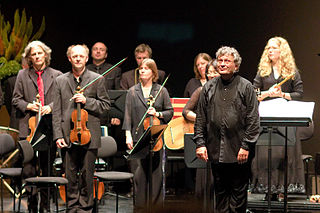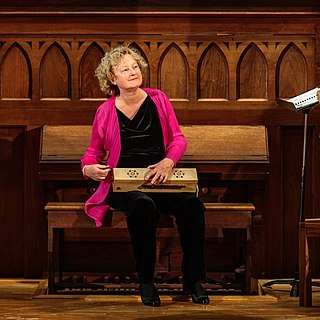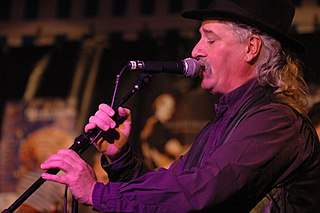Related Research Articles

René Jacobs is a Belgian musician. He came to fame as a countertenor, but later in his career he became known as a conductor of baroque and classical opera.

Anne Azéma is a French-born soprano, scholar, and stage director. She is currently artistic director of the Boston Camerata. She has been an important or leading singer of early music since 1993. She has created and directed programs for the Boston Camerata and is also noted as a music scholar. She is perhaps best known for performing music from the Middle Ages, lute songs from the Renaissance period, Baroque sacred music, Shaker song, and contemporary music theater. She is also a music educator and a researcher. She has performed in Japan, Germany, the US, Australia and elsewhere.
Gérard Lesne is a French countertenor. He is also the founder and artistic director of the baroque music ensemble, Il Seminario Musicale.
The Lamentations of Jeremiah the Prophet have been set by various composers.
Noémi Rime is a French soprano. She regularly appears in opera productions by William Christie's Les Arts Florissants ensemble. Her roles have included Cleone in Médée, Dido in Dido and Aeneas, and Fatime in Les Indes galantes. She currently teaches on the faculty of the Conservatoire à rayonnement régional de Poitiers.

Médée is a tragédie mise en musique in five acts and a prologue by Marc-Antoine Charpentier to a French libretto by Thomas Corneille. It was premiered at the Théâtre du Palais-Royal in Paris on December 4, 1693. Médée is the only opera Charpentier wrote for the Académie Royale de Musique. The opera was well reviewed by contemporary critics and commentators, including Sébastien de Brossard and Évrard Titon du Tillet, as well as Louis XIV whose brother attended several performances, as did his son; however, the opera only ran until March 15, 1694, although it was later revived at Lille.

Les Arts Florissants is a Baroque musical ensemble in residence at the Théâtre de Caen in Caen, France. The organization was founded by conductor William Christie in 1979. The ensemble derives its name from the 1685 opera Les Arts florissants by Marc-Antoine Charpentier. The organization consists of a chamber orchestra of period instruments and a small vocal ensemble. Current notable members include soprano Danielle de Niese and tenor Paul Agnew, who has served as assistant conductor since 2007. Jonathan Cohen is also on the conducting staff; Christie remains the organization's Artistic Director.

Stile Antico is a British vocal ensemble, specialising in polyphonic early music composed prior to the eighteenth century. Like groups such as the Tallis Scholars or The Sixteen, it has roots in the choral tradition of the Oxford and Cambridge colleges, but, unusually for groups tackling complex polyphony, Stile Antico has no conductor. The singers rehearse and perform as chamber musicians, an approach which has been praised by critics.

Érik Marchand is a Breton traditional singer and player of the treujenn-gaol. Although born in Paris, his family was of Breton origin, hailing from Quelneuc, Brittany.
Agnès Mellon is a French soprano who specializes in baroque music.
La Chapelle Royale is a French ensemble of baroque music.
Leçons de ténèbres is a genre of French Baroque music which developed from the polyphonic lamentations settings for the tenebrae service of Renaissance composers such as Sermisy, Gesualdo, Brumel, Tallis, and Tomás Luis de Victoria into virtuoso solo chamber music.
Le Concert Spirituel is a French ensemble specialising in works of baroque music, played on period instruments. Founded by Hervé Niquet in 1987, it is named after the 18th-century concert series Concert Spirituel. The group performs internationally, playing mostly rarely performed sacred music and operas, and making recordings. Its focus is on French music played at the court of Versailles.
Henri Ledroit was a French counter-tenor, the first in France of the modern revival in that voice range. Originally training to be a baritone in 1972 he met Alfred Deller and decided to train as a countertenor. He made many of the earliest recordings of pieces later to become standards of baroque countertenor repertoire - for example his Orphée Descendant aux Enfers H 471 of Marc-Antoine Charpentier.
The Ensemble Jacques Moderne, directed by Joël Suhubiette, is a choir performing mainly the Renaissance and Baroque repertoire. It is located in Tours. The Ensemble was founded by Jean-Pierre Ouvrard in Tours in 1974, and has been directed by Joël Suhubiette since 1993.

Sabine Devieilhe is a French operatic coloratura soprano. She is known for her interpretation of works by Mozart, Baroque music, and 19th-century opera. She is often regarded as a successor to Natalie Dessay.
Jean-François Novelli is a contemporary French tenor born in Fontainebleau.

Bruno Boterf is a contemporary French tenor, specialising in Baroque and early music.

Messe de minuit pour Noël, H.9, is a mass for four voices and orchestra by Marc-Antoine Charpentier, written in 1694 based on the melodies of ten French Christmas carols. Charpentier called for eight soloists, a duo of two sopranos and two trios of alto, tenor and bass, but it can be performed by five soloists. Choir and orchestra are in four parts, scored for flutes, strings, organ and basso continuo. The mass is regarded as a unique work in both the composer's work and in the genre. While in Charpentier's time, the mass was performed by all-male choirs, it has later been performed and recorded also by mixed choirs with modern instruments.
Olivier Schneebeli is a French conductor and choirmaster, as well as music teacher, known for his work on Baroque music. He was named to the Legion of Honour in 2021.
References
- ↑ Radiofrance Archived 2013-07-02 at archive.today